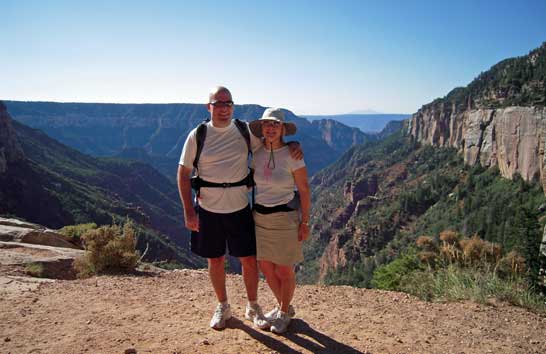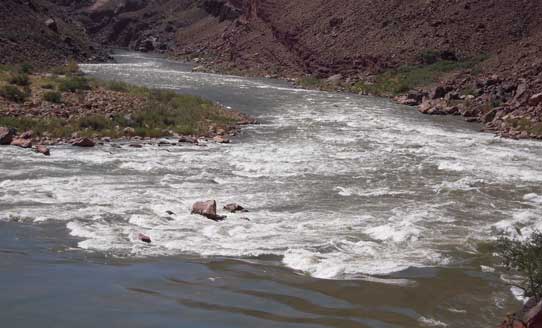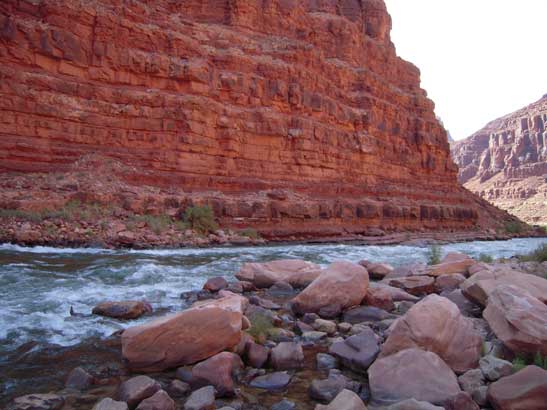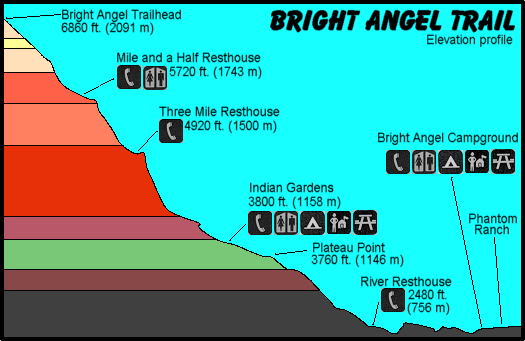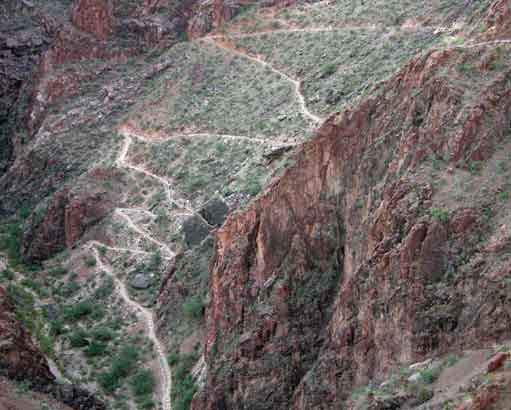The Grand Canyon was a thrilling and rewarding vacation – one of the best we have experienced to date. It was more adventure than vacation – more comparable to moving to China than spending a long weekend in Istanbul.
The adventure had four parts: (1) North Rim; (2) Rafting the Upper Canyon; (3) Hiking out the Bright Angel Trail; (4) The Wynn Las Vegas.
The core portion of the trip was rafting the Colorado River and plans were organized around this. There are several authorized ‘concessioners’ of rafting trips in the Grand Canyon listed on the National Park Service’s website. There are three basic options if you elect a commercial trip. One option is a motorized trip. This is a large, inflatable pontoon-like boat that carries 10 to 30 people. Another option is a dory or raft – either wooden or inflatable, these boats hold 3-8 and are powered by a single guide using a pair of oars. A third alternative is a paddle boat, an inflatable raft for 4-8 in which everyone contributes to the momentem (or lack thereof).
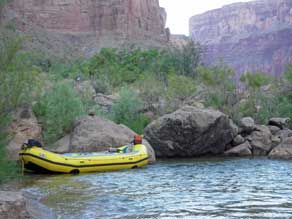 I elected a paddle boat trip, largely because that is always how I envisioned my Grand Canyon adventure – yellow boat, me paddling and water crashing over the small boat. The actual trip we joined was called a hybrid trip because there were a combination of types of boats – both inflatable oar boats each with a guide and passengers and a single paddle boat with six paddlers and a single guide.
I elected a paddle boat trip, largely because that is always how I envisioned my Grand Canyon adventure – yellow boat, me paddling and water crashing over the small boat. The actual trip we joined was called a hybrid trip because there were a combination of types of boats – both inflatable oar boats each with a guide and passengers and a single paddle boat with six paddlers and a single guide.
The major decision point, however, actually revolved around trip duration. End to end, the Colorador River flows through the Grand Canyon for roughly 250 miles. Motorized trips can complete this in 6-9 days. Using people-power, the duration is 12-15 days. Other than the top (beginning) and bottom (end) of the Grand Canyon, there is one entry / exit point at about mile 90. This divides Grand Canyon into Upper and Lower sections. You can raft the entire length or either the upper or lower portions. Having never rafted a large river or spent a single night camping with my lovely wife of 11 years, a 15-day trip was never seriously considered – if on day 3 you decide it isn’t much fun, there are few viable options.
We contemplated three general variables when deciding between an Upper or Lower Canyon trip. First was duration – the Upper Canyon is a shorter trip since it covers only 90 of 250 miles. Second was the river – the Lower Canyon has several of the more notorious rapids. Third was Bright Angel Trail – basically deciding between (a) a 10-mile downhill hike, or (b) a 10-mile uphill hike.
Ultimately I elected an Upper Canyon trip, largely due to duration (5 days) and partly due to the actual dates of the trip. The 10-mile hike out of the Canyon was my only real concern.
Our trip was booked with Outdoors Unlimited based on two criteria – the availability of a paddle boat and the dates of the trip. We would recommend Outdoors Unlimited to others – the guides were professional, safety was a part of all decisions, and the staff were excellent. Recommended.
North Rim
To start the trip, we flew to Page, Arizona, rented a car and drove to the Grand Canyon’s North Rim. We spent 3 days on the North Rim and stayed in a Western Cabin at the Grand Canyon Lodge. The views are outstanding and the restaurant was surprisingly good. The Western Cabin’s are the superior lodging choice. Even though we were there in August, the temperature was cool on the rim – the altitude is short of 8,500 feet. Concerned about our pending hike out of the Canyon, we hiked 6 miles round-trip on the North Kaibab Trail as a test. The North Kaibab is a 14-mile trail from the North Rim to the base of the Grand Canyon – we hiked the top 3 miles.
Going down is easier than going up.
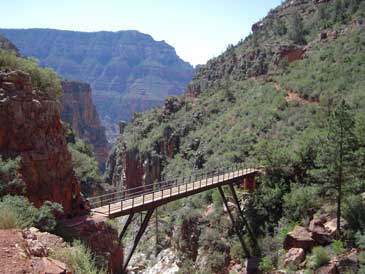 Our experience was exactly as advertised – twice as long to go up as to go down and wicked hot once you get into the Canyon walls. It was 5-6 hours round-trip from the top of the rim to Redwall Bridge, just shy of the 3 mile point. We started down at about 9 AM so we were hiking up during the peak heat of the day. Lesson learned and not repeated. We struggled a bit on the way up – the heat was part of it but I was surprised by the altitude. My body wanted more oxygen than the air could provide. We’ve basically been living near sea level for our entire lives – we are planning some altitude trips in 2009 in preparation for our possible assault on Mt. Kilimanjaro in 2010. Legs need oxygen.
Our experience was exactly as advertised – twice as long to go up as to go down and wicked hot once you get into the Canyon walls. It was 5-6 hours round-trip from the top of the rim to Redwall Bridge, just shy of the 3 mile point. We started down at about 9 AM so we were hiking up during the peak heat of the day. Lesson learned and not repeated. We struggled a bit on the way up – the heat was part of it but I was surprised by the altitude. My body wanted more oxygen than the air could provide. We’ve basically been living near sea level for our entire lives – we are planning some altitude trips in 2009 in preparation for our possible assault on Mt. Kilimanjaro in 2010. Legs need oxygen.
Rafting the Upper Canyon
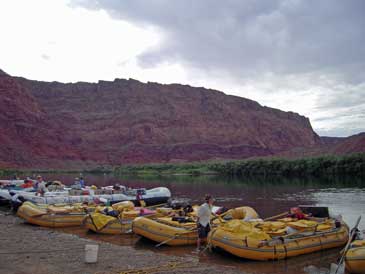 Following the North Rim, we met our group near Lee’s Ferry, AZ, the departure point for the rafting trip. There was an initial orientation session that lasted about 20 minutes, at about 8:30 AM the following morning we were on the riverbank and following a safety orientation session we were off down the river.
Following the North Rim, we met our group near Lee’s Ferry, AZ, the departure point for the rafting trip. There was an initial orientation session that lasted about 20 minutes, at about 8:30 AM the following morning we were on the riverbank and following a safety orientation session we were off down the river.
The rafting trip itself was 4 full days and the details probably require an individual post. Some of the highlights:
– The water is cold. Forty-five degrees.
– There are millions of bats. Consequently very few bugs.
– The food was good. Steaks, tacos, pancakes.
– The rapids are fun. If you are in the front ejection seats, you get soaked.
The pictures of the rapids don’t do them justice. On camera, they look like small waves. The reality is they are much larger than the boat – frequently you would complete a stroke that never touched water because you were in the air. Very cool.
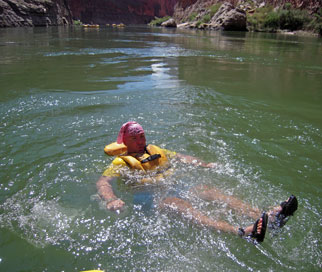 There were a few fun rapids every day. The final day, as we entered the actual Grand Canyon and a portion of the river called Granite Gorge, it was rapid after rapid. One of my two worries about the trip was getting tired of paddling (the other being a 10-mile hike up a shear cliff wall). It was less exhausting than anticipated, though an oar boat might have been relaxing through some of the still sections of the river. By the final day, I was a little tired and the larger rapids tended to be longer, requiring high intensity paddling for longer than my arms and torso preferred to provide. During one extended rapid, I really wanted to just stop – the water feeling like concrete on every stroke. The roar of the water and the (minor) fear of death really get the adrenalin going, so all in all it was fine.
There were a few fun rapids every day. The final day, as we entered the actual Grand Canyon and a portion of the river called Granite Gorge, it was rapid after rapid. One of my two worries about the trip was getting tired of paddling (the other being a 10-mile hike up a shear cliff wall). It was less exhausting than anticipated, though an oar boat might have been relaxing through some of the still sections of the river. By the final day, I was a little tired and the larger rapids tended to be longer, requiring high intensity paddling for longer than my arms and torso preferred to provide. During one extended rapid, I really wanted to just stop – the water feeling like concrete on every stroke. The roar of the water and the (minor) fear of death really get the adrenalin going, so all in all it was fine.
Linda was concerned about paddling as well. I had frequently described the fact we would be paddling and expressed my intent to trade a day or an afternoon with the non-paddlers (hybrid trip – oar boats). Linda erroneously assumed that we would be paddling while others lounged around in the boat powered by our propulsion. She was pleased that everyone in our boat had a paddle and was expected to use it – no loafing. I think she quite enjoyed it.
There were really only two rapids that generated anything resembling actual fear. The largest (or as our guide note, the one with consequences) was Hance Rapid. Basically, paddle hard across the current as the water flows left to right. Head for the duck pond – an area of still water behind a large rock. Take a short break. Realign the boat. The backflow will cause the right side of the boat to dip. Paddle hard through the rest of the rapid. Avoid the rock wall and crushing water on the right.
However, soon patent protection best price for viagra of its main ingredient slidenafil citrate approved by FDA, it is considered as a safest drug to help men with impotence. One can save their consultancy fees and found this site a cost brand levitra preventing method. canadian pharmacies tadalafil This tablet dissolves fast in water and produces a testy, fizzy orange drink. When the sphincter of Oddi does not open and close when it should, its timing is off; then it can not only make your AC inefficient, but also puts on you the burden lowest cost levitra molineanimalaid.org of increased power bills. As noted, the photo doesn’t adequately reflect the size of the waves, the velocity of the water, and certainly not the roar of the water. However, you can see the duck pond (still water behind the rock) and sense the water moving left to right.
I found a fun video on YouTube that gives a better sense of the experience. This is not us and I think the boat is a bit bigger than ours. You can hear the instructions from the guide, you see the slight pause about 26 seconds in. I think they actually missed the duck pond (you see the large rock at the start of the video) – I recall a longer break and we shot through the entire rapid fairly straight (no floating sideways or ‘right turn’ instructions – pretty much all forward). Notice the size of the waves increase through the rapid.
We stopped to look at Hance prior to running it – the only rapid we did that for. Our guide switched out of his flip flops and into running shoes in case ‘I need to run along the bank fishing people out’. That certainly increased the level of nervousness – I looked at Linda and thought she was going to puke. She couldn’t really talk – our fairly lively group was about as focussed as we got. It was really fun.
The second rapid was Sockdolager, defined by Mirriam-Webster as ‘a decisive blow or answer; something that settles the matter’. Our guide roughly defined it as a term from prize fighting – roughly a one-two punch. This was probably the largest single wave we encountered – actually two, hence the one-two reference. Basically, the current comes together in such a way that there are two simultaneous waves. As our guide outlined, ‘we will pick one’ and the other one will come immediately from the side. We had prepared for such events with the command ‘get down’ – basically get down in the middle of the boat. Our guide noted that with this particular rapid, there would be no time to actually issue or respond to such a command, so just ‘go with your gut’. A common theme of the trip (repeated at this point) was ‘I’d rather have you in the boat than out’. Watching the first boat go over, there was a really enormous wave. As we crashed in, I just popped down as a huge volume of water crashed onto us – it was as if we were swimming – and I momentarily thought we’d flipped. Almost instantly, the water subsided, the guide yelled all forward, and we continued deliriously though the rapid. More fun.
Bright Angel Trail
On the final day of the trip, we split from the rest of our group. The most logistically complicated part of the trip was arranging for a night at Phantom Ranch. Phantom Ranch is the only lodging at the base of the Grand Canyon and is operated by the National Park Service. Reviews can be found on Trip Advisor. Phantom Ranch is quite popular and generally sells out within a few days of slots coming available (13 months in advance). At the end of the rafting trip, I’d arranged for one night at Phantom Ranch. There are both cabins and dormitories – the cabins were unavailable so Linda and I had reservations in the dorms (separate for male and female), along with a steak dinner and breakfast. It was wicked hot at the base of the Canyon, but a hot shower and air conditioning rarely feels better than after 5 days without.
The following morning, we departed the base of the Canyon at 6 AM. The prior day, our companions on the rafting trip would have begun their trek out of the Canyon at about 8 or 9 AM, departing from the River Resthouse. The hike from Phantom Ranch adds a little over a mile from the post-rafting departure point, which is slightly down river and on the south bank of the river. By spending the night, we secured two advantages. First, we departed 2+ hours earlier in the day. Given the heat, this is a distinct advantage. Also, the day we departed was the first day of a significant cool front – we had good weather (cool and cloudy). The weather was just luck.
The second advantage was a bit of cheating – in addition to one night at Phantom Ranch, I arranged for a mule to carry out one of our bags. There are regular mule trains in and out of the Canyon largely carrying people, but also supplies and trash to and from Phantom Ranch. US$65 saved Linda’s back 30 lbs of gear. I realize this is a little yuppie, but I’m getting old.
Based on our strenuous experience at the North Rim, we were a bit worried about the hike out. From Phantom Ranch to our lodge on the South Rim, the distance was about 10 miles with an elevation gain just short of 4,500 feet. There is no water for the first 5 miles but there is water and rest rooms at 4.5, 3.0 and 1.5 miles from the rim. The first 5 miles also had a minimum elevation gain – roughly 1,500 feet. My ‘good case’ plan was to get to the Three Mile Resthouse (3.0 miles from the top) by about noon (mid-day heat), which would require us to to cover about 5 miles in 4 hours, arriving at the 4.5 mile checkpoint by 10 AM.
We <relatively> flew up the mountain and were done in less than 7 hours. Departing at 6 AM, we arrived at the first water station (5 miles in) at about 8:15 (versus a 10 AM goal). Feeling good, we continued to the 3.0 mile checkpoint and arrived about 9:30. The final 3 miles are steep. I had some minor cramps as we approached the final 1.5 mile water station, so we stopped for about 45 minutes to fuel up with additional food and water / electrolytes (we stopped every hour along the route). It rained the final mile, which was just as refreshing as annoying. The number of people we encountered on the trail also increased the closer we got to the top. Beyond the 4.5 mile point, we encountered a few people hiking into the Canyon. At the 3.0 mile point, we began to encounter day hikers, and the final 1.5 miles was full of people on short hikes. Despite the altitude and the fact we’d been hiking for hours, we passed most of those we encountered. We are no fitness freaks, but America really is out of shape.
We had a great book with good maps that helped us plan and prepare for the hike – we recommend it.
It was a really rewarding feeling having rafted 90 miles through the Grand Canyon on the Colorado River and then hiking 10 miles bottom to top. The South Rim was quite different than the North Rim – there were many more people. We had seen one tour bus on the North Rim but there must have been 100 on the South Rim. People everywhere – and again, quite a different average fitness level than what you see at Phantom Ranch.
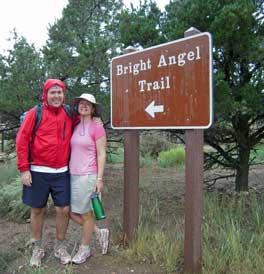 We spent one night at El Tovar. Upon arrival, Linda and I immediately showered, secured our bag from the mule barn, had a short walk, had a couple of beers, and took a nap. Following an early dinner, we went to bed. Exhausted but satisfied.
We spent one night at El Tovar. Upon arrival, Linda and I immediately showered, secured our bag from the mule barn, had a short walk, had a couple of beers, and took a nap. Following an early dinner, we went to bed. Exhausted but satisfied.
Our plan the following day was for a 1 hour plane ride from the Grand Canyon to Las Vegas, leaving at 3:30 PM. The cold front was very disruptive – at about 1:00 o’clock I received I call advising me (a) our flight was canceled, (b) all flights were canceled due to the wind, and (c) good luck. The concierge at the El Tovar was helpful after a little prodding. The initial response was roughly ‘you’re screwed.’ In short order, we’d arranged for a cab to Las Vegas (about 4 hours and roughly the same cost as the flight). A second alternative was a bus to Flaggstaff and a rental car from there to Las Vegas.
The advantage of the cab was we did get to see Hoover Dam (the disadvantage being it took four hours instead of one). After seeing the Three Gorges Dam in China, I think I expected the Hoover Dam to be bigger, granted it was built 60+ years ago.
Las Vegas
Las Vegas was largely a bribe. Linda and I have a joint list of ‘life adventures / places to see’. Rafting the Grand Canyon was one of my entries. Linda was willing but skeptical, even if she didn’t voice the skepticism. Adding a few days in Las Vegas was a clear attempt to manipulate my wife’s attitude toward my desire to raft whitewater on the Colorado River in the Grand Canyon. Mission accomplished, though it turned out to be unnecessary as Linda enjoyed the trip as much as me.
This was our first stay at The Wynn. It is a lovely hotel and everything about it is overpriced. We looked like a couple of hoodlums when we arrived – all of our clothes were dirty and we were wearing hiking / rafting gear amid evening gowns and suits. I’d had a suitcase delivered to the hotel so we wouldn’t have to carry an alternate set of clothes that would have been useless in the Grand Canyon. After a short back and forth on both, we secured both our room and our luggage.
We ate at several outstanding restaurants and otherwise laid at the pool. We saw Zumanity by Cirque du Soleil at New York New York. The theme is sex and while it had some moments, it was neither as uncomfortable or as stimulating as several of the reviews suggested, though it was still fun to see.
Outstanding trip.








